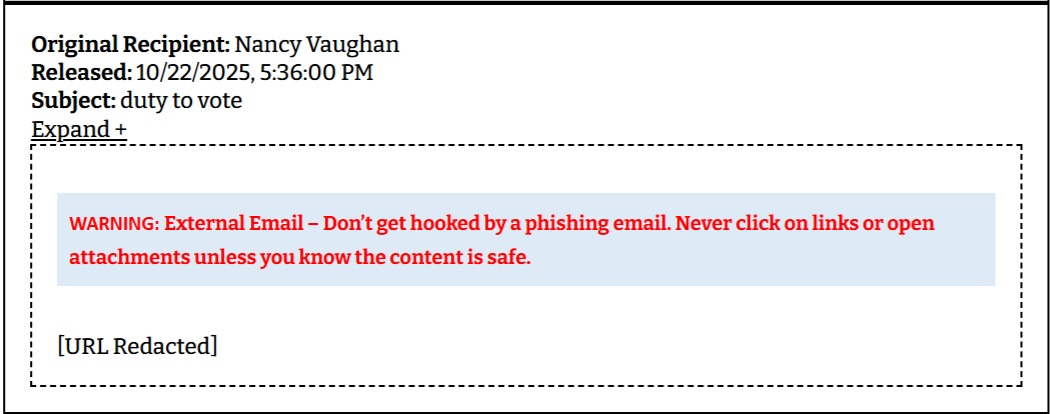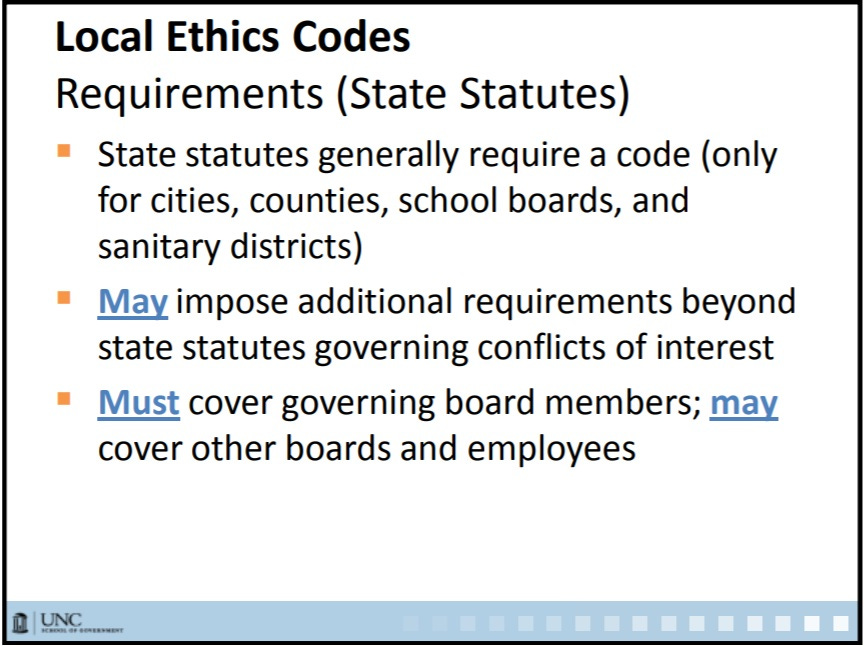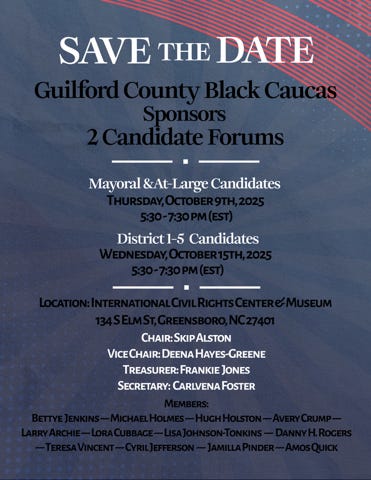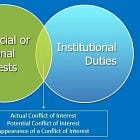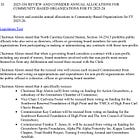The Beginning of the End of Greensboro's City Attorney Lora Cubbage
Election Interference, Impropriety and Failure to Provide Independent Legal Judgment
Former City of Greensboro attorney Chuck Watts on June 3, 2025; 1 minute, 18 seconds on § 160A-75. Voting;
Ҥ 160A-75. Voting.
(a) No member shall be excused from voting except upon matters involving the consideration of the member’s own financial interest or official conduct or on matters on which the member is prohibited from voting under G.S. 14-234 or G.S. 160D-109.”
At the time, Hartzman didn’t argue for abstention, he demanded recusal over a legally recognized conflict of interest.
Chuck Watts later resigned under a cloud of controversy, and Lora Cubbage took his place, and said relatively the same thing on October 21st. Only this time, after Mayor Nancy Vaughan read what looks like an email titled “duty to vote”, after the meeting began, from a redacted recipient;
I was told the day before Cubbage was not going to attend the meeting due to a scheduling conflict, yet she was present and appears to have solicited the response from Vaughan before concurring after; 1 minute, 59 seconds;
Days later, Cubbage twice claimed she relied on the legal opinion of a disgraced former city attorney, and appears to have enlisted the mayor of Greensboro beforehand without forming an independent opinion, most likely without Nancy Vaughan knowing;
Date: Thu, Oct 23, 2025 at 4:13 PM;
“For clarity, Councilman Matheny is operating off of the opinion of the former city attorney and thus he is well within his rights to perform as he has unless and until that opinion is changed and it has not been. ...the ethics resolution calls for an independent person/agency outside of this office. Thus, we wait...
Date: Mon, Oct 27, 2025 at 3:28 PM;
he has been operating under the advice of his attorney - former city attorney as I have not changed the opinion and pursuant to the resolution I choose to allow the opinion of the SBI to be received since they received the same documents that I received per the person that launched the ethics complaint.”
Lora C. Cubbage
City Attorney
City of Greensboro
The Creation and Propagation of a “False Truth”;
The “Duty to Vote” Email; The Mayor asserting a “duty to vote,” based on the former attorney’s opinion framed the issue as a legal requirement to proceed, ignoring compelling legal requirements to recuse due to a conflict.
The Mayor’s False Narrative; The Mayor then publicly articulated this one-sided view during the meeting, telling the public and other council members that Matheny had a “duty” to vote. This gave a false impression of legal soundness and finality.
Cubbage’s On-Record Affirmation; When the Mayor presented the narrative, Cubbage affirmed it without correction or public disclosure. This gave the “false truth” the full weight of her office, misleading the council and the electorate.
N.C. Gen. Stat. § 160A-86(b) requires the City of Greensboro to adopt a Code of Ethics, which may impose more stringent requirements than state law, including the prohibition of apparent conflicts of interest, as confirmed by the UNC School of Government in multiples of papers and continuing ethics course materials;
City Attorney Lora Cubbage violated her ethical duties by failing to provide independent legal counsel, thereby enabling ongoing violations of the City Charter, the Code of Ethics and NC State law.
The Official Conduct; Multiples of votes before and after Cubbage’s appointment expressly prohibited by City of Greensboro Policy B-22, the City Charter § 4.131 and § 160A‑86.
The City Attorney’s Failure to Act; City Attorney Lora Cubbage stated in writing that Councilman Matheny is “operating off of the opinion of the former city attorney,” and chose to not change that opinion, opting instead to “wait” for an external SBI investigation. This is an abdication of her duty to provide current, correct and independent legal advice to stop an ongoing violation of law.
What George Hartzman said before the vote; 2 minutes, 28 seconds;
The Core Legal Duty vs. The Chosen Inaction;
That Cubbage interfered rests on a failure to fulfill her duty to provide independent legal counsel, which is crucial for transparent governance, especially before an election.
Creating a Legal “Vacuum” Before an Election;
By stating, “Thus, we wait...” for an SBI investigation, Cubbage effectively created a procedural delay on a pressing civil ethical matter. This pause meant that a clear, updated legal interpretation of obligations under the city’s ethics policy was withheld from the public as they were preparing to vote. This lack of clarity can be viewed as interfering with the electorate’s right to make a fully informed decision.
By not issuing a new opinion, the City Attorney allowed Councilman Matheny to continue campaigning without the political fallout of a formal determination that his past votes violated the city’s ethics code. This prevented the issue from being resolved through the city’s own ethics process and instead left voters without an official finding on a significant question of integrity.
By not providing updated legal advice, the City Attorney’s actions effectively interfered with the public’s informed participation in the election.
A sophisticated form of election interference not through traditional voter fraud, but through the deliberate suppression of material information from the electorate. This strategy deprived voters of the ability to make an informed choice about Councilman Matheny’s fitness for office.
The Intentional Prevention of a Material Fact from Becoming Public
The most critical element is Cubbage’s subsequent private admission that she had never made a formal opinion and was choosing to “wait” for an SBI investigation.
Material Information; Whether Councilman Matheny was in violation of the City Ethics Code was highly material information for voters.
Deliberate Suppression; By refusing to issue a new, independent opinion, Cubbage actively prevented an official, on-the-record finding from being entered before the election.
Misuse of Process; Her justification, ”waiting” for an SBI criminal probe, is a misdirection. The city’s ethics code is a separate, civil administrative process. Her job was to advise on and enforce the city’s code, not to delay it indefinitely pending a separate criminal investigation.
How This Constitutes Election Interference
This meets the definition of interference; an official’s use of their power to manipulate the informational environment to favor a preferred candidate.
Abuse of Official Power; The City Attorney used her official authority to control the flow of legal and ethical information.
Creation of an Information Vacuum; Her actions ensured that the dominant public narrative was the one favorable to Matheny (”I have a duty to vote and have done nothing wrong”), while suppressing a damaging narrative.
Deprivation of Informed Suffrage; Voters will go to the polls on November 4, 2025, unaware that the City Attorney privately acknowledged the seriousness of the complaint and was deliberately postponing its resolution. They were denied the right to cast an informed vote based on a full understanding of the facts.
She weaponized her office’s procedural inertia to create a pre-election blackout on a potent scandal. By actively endorsing a flawed, old opinion and deliberately refusing to update it in private, she prevented normal accountability mechanisms from functioning in the crucial period before an election, thereby interfering with the democratic process and the integrity of the election.
N.C. Gen. Stat. § 163-275 states it is illegal for any person to “Willfully utter or publish, or cause to be uttered or published, any false statement in regard to any candidate or proposition in any primary or election... when such statement is intended to affect the chances of such candidate for nomination or election or to affect the result of the primary or election.”
The Compromising Relationships; A Web of Political Entanglement
A pervasive network of political and financial relationships between Cubbage, members of Greensboro’s City Council and City employees amongst others created an institutional conflict of interest, rendering the City’s internal ethics process incapable of impartiality.
The City Attorney’s ability to act impartially is compromised by her financial and political ties to the very body she is supposed to advise without fear or favor.
Cubbage is a named member of the Guilford County Black Caucus. As the council’s impartial legal advisor, her membership in the same organization as some of the candidates she advises looks like a consolidated political network.
Hugh Holston and Jamilla Pinder, as incumbent candidates, participated in a candidate forum hosted by the Caucus they belong to with Cubbage, making the hosting organization to not be perceived as a neutral platform for all the candidates.
Skip Alston, Deena Hayes-Green and Frankie Jones are reportedly members of the Simkins PAC. Larry Archie and Lisa Tonkins-Johnson are judges and Avery Crump is a District Attorney.
Governor Josh Stein appointed Lisa Johnson-Tonkins, daughter of former Simkins PAC and City Council member Yvonne Johnson, to serve as superior court judge to fill the vacancy created by the retirement of then Judge Lora Cubbage, who left to become a Greensboro deputy city attorney earlier in 2025.
As a candidate for judicial office, Cubbage received campaign contributions from multiple current City Council members and a former City Attorney
Donor Name………...Official Position……………………………………..Relationship to Cubbage
Nancy Vaughan Mayor / City Council Member Campaign Contributor
Hugh Holston City Council Member Campaign Contributor & Guilford County Black Caucus Member
Jamilla Pinder City Council Member Campaign Contributor & Guilford County Black Caucus Member
Tammi Thurm City Council Member Campaign Contributor
Marikay Abuzuaiter City Council Member Campaign Contributor
Nancy Hoffmann Council Member Campaign Contributor
Goldie Wells Council Member Campaign Contributor & Simkins PAC Member
Andrea Harrell City of Greensboro attorney Campaign Contributor
Rosetta Davis City of Greensboro attorney Campaign Contributor
Chuck Watts Former City Attorney Campaign Contributor
Lisa Johnson-Tonkins, Gladys Robinson, Danny Rogers, Simkins PAC members Alma Adams, Skip Alston, Earl Jones and Frankie Jones also contributed to Cubbage.
This professional and political network creates a structure of institutional entanglement, where the organizations sponsoring the official electoral process for city council members simultaneously counts among its members the sitting City Attorney and council members she is legally obligated to advise with impartiality.
This structure inherently calls into question the independence of the city’s legal and ethical oversight.
Abdication of Official Duty; Cubbage’s emails, where she stated she is “waiting” and had not changed or disavowed a prior opinion, allowed a known violation to persist. Her inaction without disclosure appears to be influenced by her conflicting relationships rather than a neutral application of the law.
Failure to Provide Independent Judgment; The City Attorney cannot provide impartial legal advice on an ethics matter concerning her political benefactors. A reasonable person, aware of these campaign contributions and omissions, would doubt her ability to rule against their interests or to advise them to take action against one of their colleagues.
An Appearance of Impropriety; Greensboro policy mandates the avoidance of even an apparent conflict of interest. The web of political and financial relationships between the City Attorney, employees in her office and the Council creates an appearance of impropriety undermining public trust.
ALLEGED VIOLATIONS BY CITY ATTORNEY LORA CUBBAGE
Failure to Provide Independent Legal Judgment; By adhering to a prior, flawed legal opinion without disclosure, she failed in her duty to provide competent and independent legal representation to City Council.
Failure to Enforce the City Charter; Her choice to “wait” and not advise immediate corrective action allowed further violations, acting against City Council’s legal interests, while not publicly informing City Council and Greensboro’s voters she was relying on an incorrect legal opinion days before an election.
Impropriety; Her connections to the Council, employees and the judiciary create a situation where her impartiality can reasonably be questioned, violating the spirit and letter of the city’s ethics policy, and therefore North Carolina State Law.
Related;
Disclaimer
The article is a commentary and analysis based on publicly available documents, emails, and legal statutes. It is written from the perspective of a government accountability organization and represents our opinion and interpretation of events.
No Legal Advice: The author is not an attorney. This article does not constitute legal advice. The information and analysis presented are for informational and educational purposes only. You should not construe any of this material as legal, professional, or financial advice. For legal guidance on any matter discussed herein, consult a qualified attorney licensed in your state.
Factual Basis: Every effort has been made to accurately represent the facts as presented in public records, including city council meeting minutes, publicly disclosed emails, and campaign finance reports. Allegations are presented as such and are based on the author’s analysis of the documented evidence.
No Guarantee of Accuracy: While we strive for accuracy, we make no representations or warranties of any kind, express or implied, about the completeness, accuracy, reliability, or availability of the information contained in this article.
Liability: Any action you take upon the information in this article is strictly at your own risk. Public Integrity Watch and the author will not be liable for any losses or damages in connection with the use of this article.


